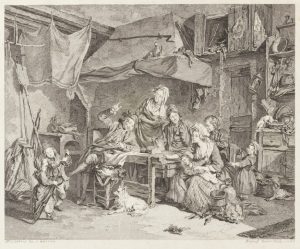Political theory comes in many forms and variations. Currently it follows academic modes of speech, which focus on the analytical distinctions and a language which connects to academic discourses. But we don’t have to go far to see how it could be different. The writings of Foucault would hardly pass the hard muster of academic peer review as they often lack the clarity and structure expected of academic papers. So would Hannah Arendt’s and those of many others, who reference discourses with great knowledge yet not necessarily systematically. Political theory comes in many shapes and forms and always has.
Story telling has been one of the more prominent modes in which political theory was presented. It is easy to think of obvious examples such as Thomas More’s Utopia – which lead to the naming of a whole genre of political theory. At the juncture of theory and literature a number of author’s have used stories to reflect upon societal and political conditions. Remember Lilliput? Gulliver’s Travels may well be read as critique his contemporary society.
But fictional accounts are not the only way in which story telling matters in political theory. Drawing historical analogies may also be understood as a form of story telling. Machiavelli uses history in his arguments on good governing quite excessively. He tells stories of failed wars and titles won, of great strategies and bad luck. I believe, anyone who argues from historical experience in political theory, in a way, chooses to tell a certain story.
A third way of using stories turns out to be common: that of allegory or parable. This is a technique that tells neither a fictional story nor refers to historical arguments in a strict sense. Instead it constructs an artificial setting in order to make a certain point. Plato’s Cave Allegory is an example. But one could think of the use of parables in the bible in a similar manner. By telling a story such as that of the Good Samaritan certain moral and ethical values are illustrated and put in an easy to understand context (admittedly, doesn’t seem to have worked too well, but that’s true for Machiavelli too…).
In so far as political theory analyses and criticizes existing conditions and suggests how thinks might be differently, story telling can be a central tool. And there is some very obvious reasons why:
- stories are easy to understand and to remember
- good stories are interesting – people want to hear them
- complex problems, when explained in form of a story, may be more easily seen in their complexity, because the also communicate an affective, emotional dimension that academic papers do not/ should not
Of course, there are also limitations – stories lack conceptual clarity and leave much to interpretation. But when it comes to political theory problems that are close to people identities, fears, hopes or values, a good story may well help to navigate the complexities of the issue. That is one of the reasons why story telling of sorts has some repute even in contemporary academia. In particular sociology has recovered the art of story telling to play out the future effects of contemporary trends. Anthropology uses it to describe complex social interactions for example when retelling the way rituals are lived. In political science scenario development is used to explain how various changes today may impact the future. All these attempts may be pursued as a subversive activity of developing a new narrative, a new way to see that which is there. When Foucault talks about the ways in which discourse may be subverted, he remains vague. I believe, that story telling – which allows the breaking of certain rules of truth and adequacy – may work as one way of subverting dominant discourse. This happens – for example in this video, which most of you have probably seen.
Clearly, story telling is no cure all. But if it helped Thomas More condemn land crabbing and displacement of the poor as thievery, maybe it is a good tool today, too.
In our next session, I would like you to come up with short stories illustrating what Judith Butler argues in her text. Find a story that illustrates/explains/clarifies what she means by performance, how that could work or why it may be important. It may be just the description of a character, a historical or fictional situation, something real or imagined. The stories will be up on this blog after for you to read.
Tags: Butler, performance, Storytelling, subject



 Die
Die
Am 8. January 2024 um 15:59 Uhr
Your blog post was engaging and inspiring. I found the content to be motivating, and it encouraged me to take action and apply the insights in my own life. To gain further knowledge on this topic, click here.